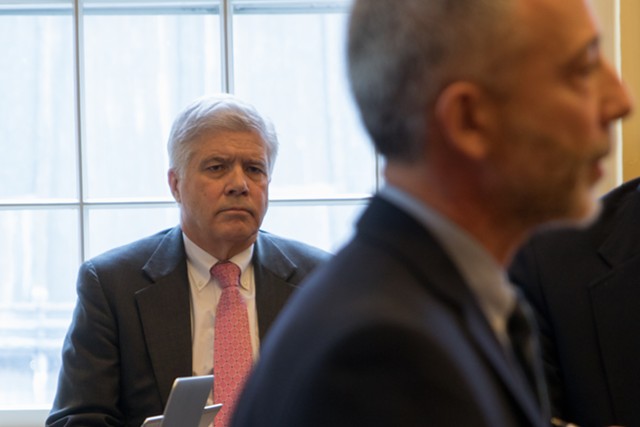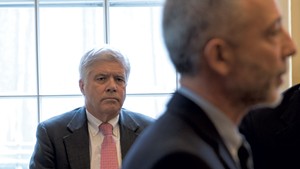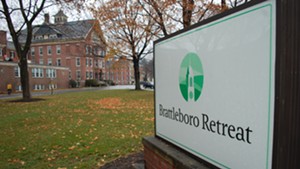
- Colin Flanders
- Secretary of Human Services Mike Smith watching Brattleboro Retreat president and CEO Louis Josephson testify
Secretary of Human Services Mike Smith said Wednesday night that negotiations over the future of the Brattleboro Retreat have left him optimistic that the center’s closure is not imminent.
“We all agreed that finding a path forward to return the Retreat to fiscal stability was the goal,” Smith told
Seven Days on Wednesday
, hours after meeting with the center's executive team in Montpelier.
The negotiations followed a morning of testimony before the House Committee on Health Care, where legislators heard about the public showdown over funding between Smith's agency and the leaders of the state's largest inpatient health and addiction treatment center.
The Retreat's president and CEO, Louis Josephson, did not return a call for comment Wednesday night, and a message left on a number listed for the board's chair went unanswered.
Wednesday's flurry of discussions arrived on the heels of recent claims from the Retreat's leadership that they may have to
sell or shutter the center if it does not receive further state aid.
The Retreat serves roughly 105 patients a day, according to Josephson, and houses more than half of the state’s mental health beds. That includes Vermont’s only inpatient residential units for children and adolescents. The facility is also Windham County’s largest employer.
The situation spilled into the public eye on Sunday when Smith issued a press release criticizing the center’s leadership for failing to improve its financial position and asking the state for more money.
“We have to have serious discussions of where the Retreat’s going, and how it’s going to do that,” Smith told legislators Wednesday morning.
Hours later, Smith said the two sides had agreed on several immediate steps to help address the Retreat's financial situation.
First, the center will hire an outside firm to review its books and make recommendations. The state will also help improve the Retreat's admissions process, which Smith hopes would identify why its patient numbers were low. And Smith said the board agreed to try to make the Retreat's outpatient services more efficient.
The early road map left Smith feeling "very, very optimistic of where we’re going to go," he said.
His comments were far different from the gloom-and-doom testimony during Wednesday morning's meeting, at which the agency head told legislators that the Retreat seemed to view the state as an “endless piggybank."
"The real problem here is that you just can't keep coming to the state and asking for money,” Smith said.
Josephson told legislators that the Retreat has been experiencing a funding shortage for years, due in part to the state's low reimbursement rates for patients on Medicaid.
A recent, unexpected decrease in patients worsened matters, Josephson said, forcing the center to consider cutting its budget by $2 million for the second straight year. He reported that the Retreat had about 30 days of cash on hand.
“We’re like many of our employees,” Josephson said, “living paycheck to paycheck, and hoping the boiler doesn't go boom this winter, because we won't be able to cover it.”
Smith said the state has tried to help offset the shortfalls. In November, he signed off on a rate increase for the Retreat worth a projected $5.3 million over two years. The state also recently agreed to build and maintain 12 additional beds for high-needs mental health patients. Smith estimated that the state had recently committed more than $16 million to the institution.
But early last week, Josephson met with Smith to ask for another rate increase to cover a new deficit. Smith rejected that request.
Explaining the decision Wednesday, Smith said he had not seen enough changes at the Retreat to ensure its leaders wouldn’t return in two months for more cash.
Josephson told legislators he understood that the state does not have a lot of funding to throw around. He said the center could try to "right size" its operation by cutting up to 25 percent of its beds.
“If there’s no more money, we will work it out. I’m really here for my patients,” he said. “I don't care if Secretary Smith requires that I be terminated to get some money for the Retreat. I just don’t want our patients to get hurt in the process.”
Health Care Committee chair Bill Lippert (D-Hinesburg) said he scheduled Wednesday’s testimony so legislators could get a briefing on the Retreat's future.
He opined that the legislature should avoid interfering with the negotiations between Smith’s agency and the Retreat for the time being. But he called the Retreat a key partner in the state’s mental health system, and said no one wants to see the system disrupted “in a catastrophic way.”
Smith said that while he believes there are still "a lot of issues we have to work through," he was encouraged by the "atmosphere" of the negotiations, describing them as cordial and productive.
"The tone has changed dramatically," he said.













Comments
Showing 1-1 of 1
Comments are closed.
From 2014-2020, Seven Days allowed readers to comment on all stories posted on our website. While we've appreciated the suggestions and insights, right now Seven Days is prioritizing our core mission — producing high-quality, responsible local journalism — over moderating online debates between readers.
To criticize, correct or praise our reporting, please send us a letter to the editor or send us a tip. We’ll check it out and report the results.
Online comments may return when we have better tech tools for managing them. Thanks for reading.